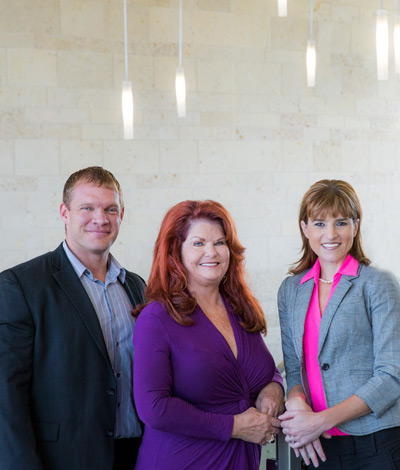Children continue mother’s legacy with Alzheimer’s research gift

More than 40 years ago, Jareen Schmidt founded the J.E.S. Edwards Foundation to support issues dear to her heart, such as health and wellness in Fort Worth.
So when Alzheimer’s disease required her to transfer Foundation leadership duties to her children, they knew how to continue her legacy. The foundation made a gift to advance potentially ground-breaking research at UNT Health Science Center that could unlock the secrets of Alzheimer’s.
“Alzheimer’s disease runs in our family because my mother has it and my grandmother had it before her,” said Sheryl Sewell, Schmidt’s daughter. “It’s a really personal issue for us, and I’m really excited about the innovative approaches taken by UNT Health Science Center scientists to study this disease.”
A portion of the foundation’s donation will support research headed by Leigh Johnson, PhD, into the relationship between depression and Alzheimer’s. Depression is a known risk factor for Alzheimer’s, and research studies have suggested that a subset of people who suffer depression and memory loss show improvement while undergoing antidepressant therapy.
Dr. Johnson and other UNTHSC researchers are conducting an innovative clinical trial that seeks to treat targeted patients at risk for Alzheimer’s disease specifically due to depression-related issues. This personalized approach to treating Alzheimer’s disease may be one key to unlocking this devastating disease. It also is one of the first times research developed at UNTHSC has reached the clinical trial phase, where it could directly benefit Fort Worth residents.
“Unraveling the pathways that lead to the development of Alzheimer’s disease remains the best hope to fight this disease,” Dr. Johnson said.
The gift will also fund seed grants to support young researchers’ most innovative ideas for solving Alzheimer’s. Seed grants allow researchers to build data and pursue even greater funding through federal or private sources, said Sid O’Bryant, PhD, a nationally recognized Alzheimer’s researcher.
“The funds to support seed grant research from the J.E.S. Edwards Foundation are of tremendous importance,” said Dr. O’Bryant, Associate Professor of Internal Medicine. “These funds will help push forward these new approaches that incorporate many different research disciplines to tackle brain disease in new ways.”






Social media